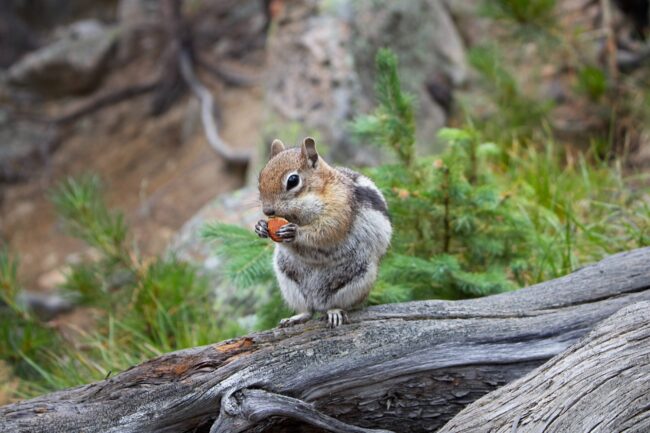Table of Contents
Chipmunks are omnivorous, and they eat both plants and animals. Chipmunks are a part of the rodent family, and they are tiny mammals. For plants, they usually eat nuts, seeds, berries, etc. Whereas in the case of animals, they usually consume frogs, insects, and even baby birds.
They do eat eggs as well but don’t prefer hunting for them. They eat it if they find it. For their hibernation, they tend to store more plants, nuts, and seeds, which become their only food source during the winter season.
Although chipmunks are from the rodent family, they hunt for mice and eat them. They also eat fungus and seeds that allow the roots of the trees to grow and thrive. This helps spread the fungi and seeds of different trees and plants, which is beneficial for the trees to grow.
Do Chipmunks Eat Mice?
Most chipmunks hunt for food, and their diet mainly consists of an acorn, nuts, and the like. However, if the chipmunks are domestic, they are also fed with vegetables, fruits, and grains. Cereals are also a part of their diet.
Most of the time, they tend to hunt for small birds and their eggs. They are seen eating more non-perishable food if there aren’t many insects or worms around.
Do chipmunks kill mice?
Chipmunks hunt for mice; however, it is sometimes merely for territorial purposes. They are almost the same size as the mice. This is one of the main reasons why they tend to hunt for smaller mice than adult ones.
Hunting for mice can be difficult for them sometimes, especially if they are bigger. Hence, chipmunks prey on baby mice or even a dead mouse. Since they don’t tend to run away or fight back, it becomes easier for the chipmunks to prey on them.
Chipmunks also eat them when there isn’t enough water or food. Due to this reason, they get their hands on the mice because they need food to survive. This may even drive them to even eat other chipmunks.
Domesticated chipmunks can’t consume mice mainly because their immune systems are built differently. They are also more prone to contracting various diseases if they consume wild mice.
Since domesticated animals have a different diet, food sources are also carefully selected, keeping in mind their nutrient intake. Whereas chipmunks can’t get infected with any disease as such. Mice also have their diets in line and aren’t prone to many diseases.
Most of the time, chipmunks are always ready to prey on any helpless and dead mouse, especially since there aren’t many options available.
Domesticated Chipmunks
Some people tend to keep chipmunks as pets, but this might not be quite ideal in actuality. A well-known fact about chipmunks is that they live in tunnels and small holes similar to squirrels.
Hence their entire food source depends on how their burrowing skills. Moreover, if they are kept as pets, it is more likely that they will ruin all the food that is preserved. This is most likely to happen in terms of fruits and nuts.
Another important aspect of being noted is that chipmunks carry a lot of diseases that can easily be transmitted to the person keeping them as pets. They have fleas and other bacterial diseases that will harm the person and other pets if they have some.
The chipmunks also have rabies, and even though it can be rare, they can spread it to humans through direct contact. The most common infection that can spread easily is parasites like roundworms.
Suppose you are planning to get a chipmunk as a pet along with a dog. The dog’s health might be at risk because they are more susceptible to getting infections from roundworms.
The vet should be contacted immediately if there are chipmunks around your pets because they may have contracted any disease that might even lead to your pet’s death.
What other animals eat mice?
Rats and mice are some of the smallest and weak animals that can be targeted easily by other animals for food. They can’t fight back and are helpless, and it is easier to get hold of.
Cats are seen as the most well-known predator of mice. However, they do not eat the mice; they chase them and kill them. They do not eat them right after, in fact, the cats tend to play around for a bit and leave them as it is.
Spiders also prey on mice, which might seem a bit odd. However, big spiders, namely the Huntsman Spider and tarantulas are big enough to get a hold of the mice. The Huntsman spider usually doesn’t make its webs to trap their prey. They hunt down their prey and bite the same to ensure that the prey doesn’t move.
Big birds are also known to prey on mice. Most of the time, eagles, and owls fly high and hunt these sort of small creatures to eat. Hawks are seen to be experts in hunting down mice. They usually hunt the mice at night, and they can do so merely with the help of their auditory skills.
Lastly, humans also eat mice like any other meat. Some countries where this sort of delicacy is famous are Korea, China, Vietnam, and many more. They are considered a great source of protein, and they can easily be found in restaurants. Most people also tend to prepare and cook mice in their homes.
Chipmunks can be a nuisance to the household.
If there are any chipmunks around your house, there is a huge possibility of them causing a lot of damage to the house and other things as well. They eat fruits and flowers too, and their burrowing might lead to serious problems.
Their burrows are usually 3 feet deep in the ground and can be as long as 30 feet. They mainly make this for their hibernation period and to store their food. However, this may cause structural damage in and around your house and should be taken care of as soon as possible.
They might destroy any fruits or flowers around your house. Their burrowing will harm the stairs and foundation of the house. It will cause damage to the entire structure of the house. Ornamental objects and food stored in your house can also be damaged.
Moreover, if they are around, they are likely to transmit various sorts of infections and diseases to the pets. If a chipmunk bites you, the injury will need immediate attention. The bleeding should be controlled and if it is serious, visiting the hospital is a must to prevent any sort of infection or virus from spreading in the body.
How can chipmunks be trapped?
Before moving forward, being on terms with the state’s laws is necessary. Some states and countries do not allow the killing of chipmunks. However, they can be trapped if killing them isn’t allowed and let out in a forest area after that.
Humane traps are one of the easiest ways to get hold of the chipmunks without causing any sort of harm to them. A live trap can be used to catch them. Spring-loaded doors will be able to catch them in one go.
Since there aren’t any traps made specifically for chipmunks, using rat traps will also do the job. Snap traps are yet another method of trapping chipmunks. This kills them instantly, and it needs to be disposed of as soon as possible.
If the trap isn’t cleaned and their body is left to decompose on its own, this will attract other animals, which should be avoided at all costs. Predators like snakes, coyotes, hawks, and many more will prey on them if the trap is left with the chipmunk out in the open.
Summing up
Mice are seen to be quite easy prey, and chipmunks can hunt them down quite quickly. Since they are omnivores, they eat plants and animal matter. If there is a lack of food or water source, chipmunks might even kill other chipmunks for food.
They also prey on baby birds and eggs, anything that is quite helpless and can’t fight back. Chipmunks mainly prey on baby mice or dead ones. They also create a lot of damage to the house and the food stored. They are susceptible to transferring diseases to pets as well.
Covering up the holes in the lawn can be a great fix to prevent the chipmunks from burrowing their way into the house. The more dirt or soil is used to fill every chipmunk hole, the lesser chance they will get closer to the yard of the house.

